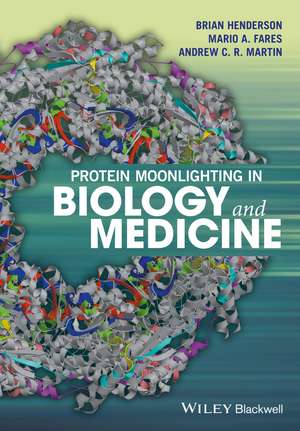Protein Moonlighting in Biology and Medicine
Autor B Hendersonen Limba Engleză Hardback – 8 dec 2016
The past 25 years has seen the emergence of a wealth of data suggesting that novel biological functions of known proteins play important roles in biology and medicine. This ability of proteins to exhibit more than one unique biological activity is known as protein moonlighting. Moonlighting proteins can exhibit novel biological functions, thus extending the function of the proteome, and are also implicated in the pathology of a growing number of idiopathic and infectious diseases.
This book, written by a cell biologist, protein evolutionary biologist and protein bioinformatician, brings together the latest information on the structure, evolution and biological function of the growing numbers of moonlighting proteins that have been identified, and their roles in human health and disease. This information is revealing the enormous importance protein moonlighting plays in the maintenance of human health and in the induction of disease pathology.
Protein Moonlighting in Biology and Medicine will be of interest to a general readership in the biological and biomedical research community.
About the Authors
Brian Henderson, Division of Infection and Immunity, University College London, London, UK
Mario A. Fares, Institute of Integrative Systems Biology (CSIC ]UV), Valencia, Spain
Trinity College Dublin, Dublin, Ireland
Andrew C. R. Martin, Division of Biosciences, University College London, London, UK
Preț: 839.42 lei
Preț vechi: 1233.03 lei
-32% Nou
160.63€ • 168.27$ • 133.12£
Carte indisponibilă temporar
Specificații
ISBN-10: 1118952081
Pagini: 328
Dimensiuni: 172 x 253 x 21 mm
Greutate: 0.79 kg
Editura: Wiley
Locul publicării:Hoboken, United States
Public țintă
Researchers and graduate students in protein science, systems biology, cell/molecular biology, microbiology (especially those in immunology and infectious disease)Notă biografică
Brian Henderson is Professor of Biochemistry at University College London. He started his research career as a cell biologist, migrating to become an immunologist then pharmacologist with six years experience in the pharmaceutical industry. In the early 1990s studies of bacteria-host interactions identified a bacterial molecular chaperone, chaperonin 60, as a potent signalling molecule able to induce osteoclast formation and bone remodelling. This was Henderson's introduction to protein moonlighting and he has spent the past twenty years exploring the roles of bacterial and human moonlighting proteins in human health and disease.
Mario Fares is a Principal Investogator in the Evolutionary Genetics and Bioinformatics Laboratory at Trinity College. His research is focused on the understanding of the selective forces shaping the evolution of proteins, proteomes and genomes. Most of the concepts dealt with in his laboratory are related to the field of molecular evolution and the complexity of mutations relationships. Taking these interests and concepts to the level of comparative genomics and proteomics adds the dimension of systems biology to his research.
Andrew Martin is a researcher in the Bloomsbury Center for Bioinformatics at University College, London. His research focuses on structural bioinformatics: developing tools to investigate and understand the relationship between protein sequence, structure and function. Within this general area, his main interests are protein modelling, structural analysis, structural immunology, effects of mutation on protein structure and disease, application of relational databases, automation and software development.
